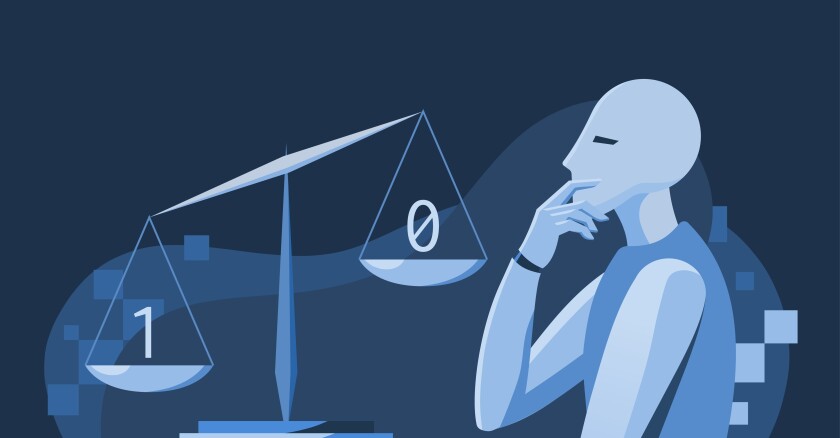Science
Aspen Institute Launches Initiative to Combat AI Bias in Education

The global nonprofit organization Aspen Institute has launched an initiative aimed at addressing racial bias in artificial intelligence (AI) tools used in education. This project, which began in 2020, focuses on ensuring that educational technology (ed-tech) is equitable for all students, particularly for Black and brown students who represent over half of the K-12 population in the United States.
In a recent report published in September 2023, Aspen Institute Fellows Nidhi Hebbar and Madison Jacobs outlined the project’s objectives and resources. They noted that many existing educational tools contain biases that can disadvantage students of color, leading to issues such as disproportionate disciplinary actions, placement in less rigorous academic tracks, and inequitable access to resources.
To tackle these challenges, the initiative provides several targeted resources. One of the key outputs is the AI in Education Toolkit for Racial Equity, designed for ed-tech companies. This toolkit encourages product teams to define the goals and values of their AI tools clearly. It also prompts teams to assess whether AI is the right solution for the educational challenges they aim to address and to consider the potential risks to racial equity if the algorithms fail to perform as intended.
The toolkit emphasizes identifying and addressing biases during the design phase. It guides teams to carefully evaluate their data sets and logical assumptions, ensuring that the tools are responsive to the diverse backgrounds of students. This careful consideration continues throughout the implementation process, including training educators on the equitable use of these technologies.
Nidhi Hebbar expressed optimism regarding the integration of these practices, stating, “In an ideal world, companies would embed the activities and practices in our toolkit into their standard development processes.”
In collaboration with Digital Promise, the Aspen Institute also introduced a product certification to enhance equity in AI design. The Prioritizing Racial Equity in AI Design certification establishes industry standards for equitable design practices. It outlines five key qualifications, including the requirement for at least two bias-mitigation strategies and the ability for users to override decisions made by the AI for individual learners.
For K-12 districts assessing ed-tech software, the initiative offers additional resources, including audit questionnaires and a rubric to evaluate vendors based on equity criteria. The School Procurement Guide contains essential questions about the development and testing of products, as well as how data is utilized and how racial information impacts that data.
“By asking the right questions during procurement, your school can become a powerful partner in advocating for equitable design and development of the products they use,” the guide states.
Currently, there are no laws mandating that ed-tech providers disclose potential biases in their AI systems, leaving schools to seek transparency and fairness proactively. The Aspen Institute’s initiative underscores the importance of tackling these biases to prevent the amplification of existing disparities in the education system.
The project represents a significant step towards ensuring that educational technology serves all students equitably, challenging the status quo and advocating for systemic change in how AI is integrated into learning environments.
-

 Entertainment3 months ago
Entertainment3 months agoAnn Ming Reflects on ITV’s ‘I Fought the Law’ Drama
-

 Entertainment4 months ago
Entertainment4 months agoKate Garraway Sells £2 Million Home Amid Financial Struggles
-

 Health3 months ago
Health3 months agoKatie Price Faces New Health Concerns After Cancer Symptoms Resurface
-

 Entertainment3 months ago
Entertainment3 months agoCoronation Street’s Carl Webster Faces Trouble with New Affairs
-

 Entertainment3 months ago
Entertainment3 months agoWhere is Tinder Swindler Simon Leviev? Latest Updates Revealed
-

 Entertainment4 months ago
Entertainment4 months agoMarkiplier Addresses AI Controversy During Livestream Response
-

 World2 weeks ago
World2 weeks agoBailey Announces Heartbreaking Split from Rebecca After Reunion
-

 Science1 month ago
Science1 month agoBrian Cox Addresses Claims of Alien Probe in 3I/ATLAS Discovery
-

 Entertainment2 weeks ago
Entertainment2 weeks agoCoronation Street Fans React as Todd Faces Heartbreaking Choice
-

 Health4 months ago
Health4 months agoCarol Vorderman Reflects on Health Scare and Family Support
-

 Entertainment4 months ago
Entertainment4 months agoKim Cattrall Posts Cryptic Message After HBO’s Sequel Cancellation
-

 Entertainment3 months ago
Entertainment3 months agoOlivia Attwood Opens Up About Fallout with Former Best Friend





















